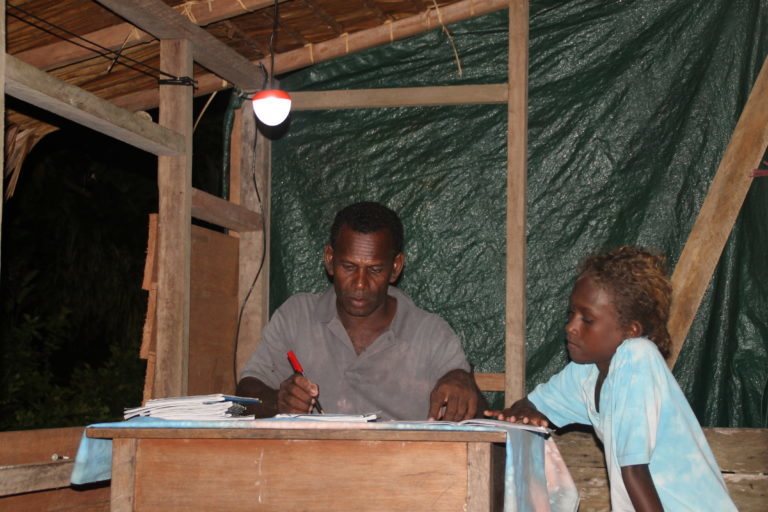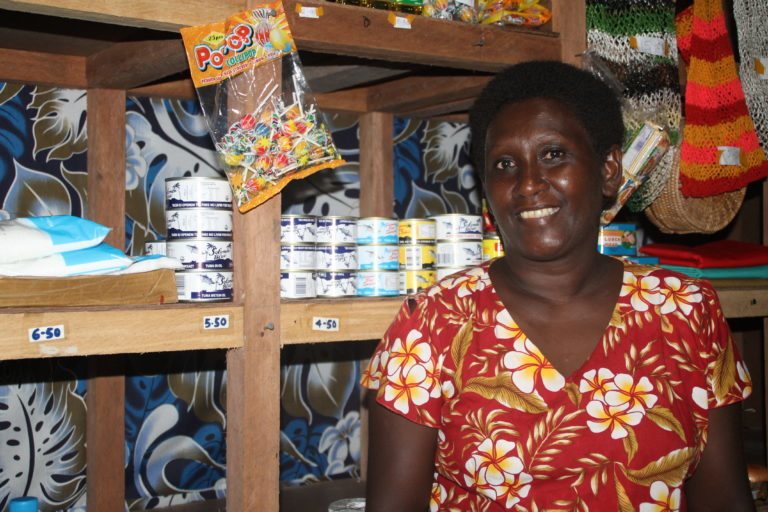Lighting a Brighter Future for Families in Solomon Islands
Tags
Under a solar light on the back porch of his mother’s canteen sits 10-year-old Ashley Alevia, doing his homework.
It’s eight in the evening and his father Terry, a school teacher sits next to him grading student papers. They live in Dunde Village, a community in Munda, Solomon Islands.
 Terry and Ashley Veo, sit under a solar light going over school lessons. © 2018 PFIP Erica Lee
Terry and Ashley Veo, sit under a solar light going over school lessons. © 2018 PFIP Erica Lee
The community is quiet tonight, only a handful of homes are dimly lit by kerosene lanterns, but most of the community is in darkness with families already tucked away in bed. This used to be the same reality for Ashley and Terry prior to 2016 when they too did not have solar lighting.
Outside of Honiara (the capital of Solomon Islands), live 90 percent of the population, and only about six percent of households are connected to the national electricity grid. Most families throughout the country are without access to safe, affordable and reliable electricity and rely on costly sources of energy and lighting such as kerosene lamps or battery-operated lanterns. For a low-income earning family this expense can consume a substantial portion of their income, making solar energy a practical and cost-efficient alternative solution for Solomon Islanders.
South Pacific Business Development (SPBD), a microfinance company, is providing a solution that has allowed financially excluded rural women to access formal financial services and solar energy. In May 2015, SPBD introduced a Solar Energy Loan program to provide more accessible and cost-efficient energy to their clients. SPBD partnered with Honiara Hardware Supplies Ltd. to facilitate clients’ access to high-quality, affordable solar appliances (solar-powered lanterns, off-grid solar generators, etc.) through discounted product rates and a comprehensive loan disbursement plan. This loan of SBD $1,650 (USD $212.12) funds the purchase of a funds solar kit containing a solar panel, three light bulbs with 8 metres of cord, a torch and a USB charging port. A fully charged solar panel can light up a home for up to 15 hours, depending on the brightness settings used.
Vicky Veo, the matriarch of her family, is the reason why her household now enjoys the benefits of solar energy. She got a solar energy loan from SPBD in 2016, and this has had a big impact on her small family.
Vicky is now earning bigger profits from the longer hours she is able to operate thanks to the solar lighting. This has also given her a competitive edge over competing canteens in her community, who must close once evening falls.
She started the canteen in 2016 through another microfinance loan also from SPBD and has since grown the number of products she sells.
“My canteen has given me financial freedom and I am happy that I do not have to rely on my husband for income,” she said when asked about the benefits of taking out a loan from SPBD.
Though Vicky has had a bank account with a major bank for many years, she says that she would not have qualified for a loan from the same bank even though she has been saving for some time. Vicky says she is grateful to SPBD for giving her an opportunity to start a business that has led to her financial independence.
Vicky says that the solar energy loan also allows her to save more money now that she no longer has to rely on kerosene lamps, which used to cost her at least SBD $60 (USD $7.73) a week. This also means that she can put those savings towards repaying her solar energy loan.
 Vicky Veo, took out a solar energy loan from SPBD in 2017.
Vicky Veo, took out a solar energy loan from SPBD in 2017.
© 2018 PFIP Erica Lee
The family of three are a great example of the benefits that solar energy loans are bringing to rural communities in the Solomon Islands. Children, like Ashley, can now study for longer hours and their parents can work extra hours to help them earn more income to improve their standard of living.
Between June 2016 and December 2017, 822 families like Vicky’s have benefited from solar energy loans, thanks to a grant provided by the Pacific Financial Inclusion Programme (PFIP) to SPBD. The grant enabled SPBD to expand the solar kits to many more rural households in Guadalcanal and the Western province.
Though the project proved successful, it only achieved 61% of its expected targets due to an influx of cheaper, sub-standard solar products and community development projects funded by politicians, which hindered the full implementation and uptake of the product.
SPBD is a private incorporated microfinance company that began operations in the Solomon Islands in 2014. The microfinance company helps rural women entrepreneurs to start or grow small businesses and offers micro savings, business development advice, and extensive financial literacy training integrated into its microfinance program. Their field officers travel to the villages of their clients every week to enable regular convenient, affordable loan repayments and savings to empower rural women to improve their livelihoods and quality of life.
PFIP is a Pacific-wide programme that has helped over 1.6 million low-income Pacific islanders gain access to financial services and financial education. It achieves these results by funding innovative approaches through financial services and delivery channels, supporting policy and regulatory initiatives, and empowering consumers.
PFIP is jointly administered by the UN Capital Development Fund (UNCDF) and the United Nations Development Programme (UNDP) and receives funding from the Governments of Australia, New Zealand and the European Union.